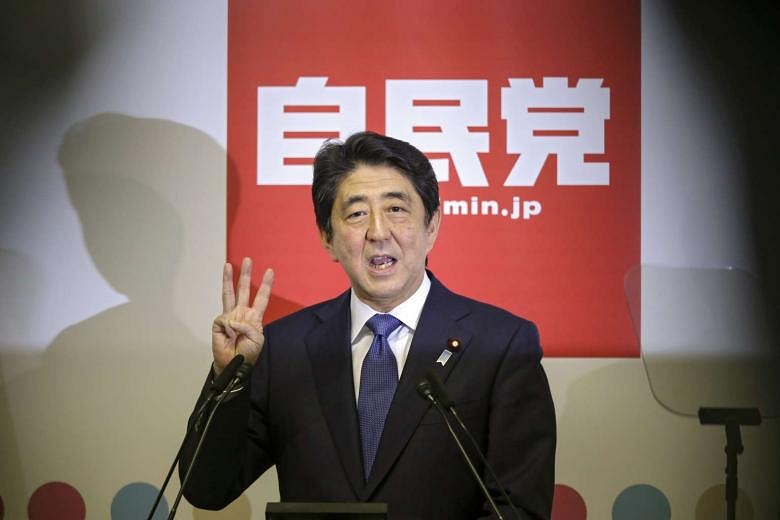TOKYO • Japanese Prime Minister Shinzo Abe unveiled a new economic growth target, switching his policy focus to children and the elderly after the passage of unpopular defence Bills last week sparked scuffles in Parliament and undermined public support.
In remarks following his official reappointment yesterday as leader of the ruling Liberal Democratic Party, Mr Abe scarcely mentioned tricky regulatory reforms that many economists say are already too slow.
Instead, he laid out three new "arrows" of his so-called Abenomics policies - bolstering the economy, offering support for families raising children and promoting social welfare reforms.
He vowed to raise the gross domestic product target to 600 trillion yen (S$7.2 trillion), up from the current 500 trillion yen. But he stopped short of setting a time frame for the new GDP target.
Facing the need to rebuild public support with 10 months to go before an Upper House election in July next year, Mr Abe said he would focus on shoring up economic growth and reform the social security system to make it easier to work while raising children and caring for the growing ranks of elderly.
"The economy will continue to be our top priority," Mr Abe told the news conference. "The goal is to create the largest economy in the post-war era to help make people's livelihood the most affluent. I'll make GDP worth 600 trillion yen as our clear target."
He also said he would raise the sales tax to 10 per cent from the current 8 per cent in April 2017 as planned, barring big economic shocks, and put revising Japan's US-drafted pacifist Constitution - a potentially divisive issue - on the agenda in next year's Upper House election.
The GDP target could draw criticism for being unrealistic because it implies levels of growth not seen in the last two decades, while economists doubt the government will enact policies bold enough to even come close to the target.
Since Mr Abe took office in late 2012, nominal GDP has expanded 5.8 per cent as the central bank pursued quantitative easing.
In fiscal year 2014, nominal GDP was 491 trillion yen. Since fiscal year 1994, the earliest date that data is available, Japan's nominal GDP has actually contracted by 1 per cent.
Mr Abe's massive monetary stimulus and fiscal spending have also weakened the yen about 30 per cent against the dollar, boosting exporters' profits and stock prices. Economists have called for more deregulation, especially in the labour market, to encourage corporations to invest their record cash reserves.
Mr Abe's change in policy direction comes after his security Bills to expand the role of Japan's military - criticised by many as a breach of the country's pacifist Constitution - triggered huge protests outside Parliament.
The legislation eroded his voter ratings, which fell six points to 40 per cent in a poll published on Monday by the Nikkei business daily. His disapproval rating rose seven points to 47 per cent.
"The result of Abe's security policies has been that public approval has tumbled," said independent political analyst Minoru Morita. "He is probably worried about that and is turning back to the economy as a way to claw back public support."
Achieving the 600 trillion yen target "would be pretty hard, even if you look at a time frame of 10 years," said Ms Junko Nishioka, chief economist for Japan at Sumitomo Mitsui Banking Corp in Tokyo.
She added that it was theoretically possible to reach the nominal goal through monetary easing and inflation, but that Mr Abe should keep his focus on strategies to boost growth.
BLOOMBERG, REUTERS

